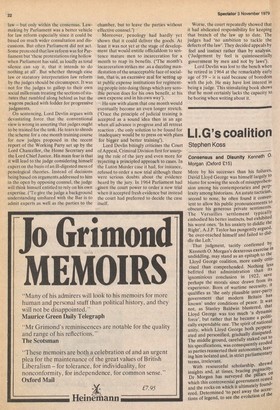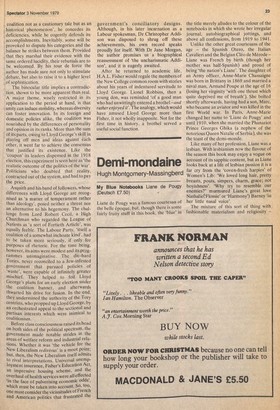LI.G's coalition
Stephen Koss
Consensus and Disunity Kenneth 0. Morgan (Oxford E15)
More by his successes than his failures, David Lloyd George was himself largely to blame for sowing the seeds of misapprehension among his contemporaries and perplexity among historians. An astute tactician, second to none, he often found it convenient to allow his public pronouncements to obscure his generous private sentiments. The Versailles settlement typically embodied his better instincts, but exhibited his worst ones. 'In his anxiety to diddle the Right', A.J.P. Taylor has pungently argued, 'he over-reached himself and failed to diddle the Left.'
That judgment, tacitly confirmed bY Kenneth 0, Morgan's dexterous exercise in undiddling, may stand as an epitaph to the Lloyd George coalition, more easily criticised than comprehended. Nothing less befitted that administration than its ignominious conclusion in 1922, save perhaps the morals since drawn from its experience. Born of wartime necessity, it qualifies as 'the only plausible inter-partY government that modern Britain has known' under conditions of peace. It was not, as Stanley Baldwin blustered, that Lloyd George was too much 'a dynamic force', but rather that he became a politically expendable one. The spirit of national unity, which Lloyd George both perpetuated and personified, gradually dissipated. The middle ground, carefully staked out to his specifications, was consequently eroded as parties reasserted their autonomies, leaving him isolated and, in strict parliamentary terms, irrelevant. With resourceful scholarship, shrewd insights and, at times, bracing pugnacity, Dr Morgan has surveyed the which this controversial government rested and the rocks on which it ultimately foundered. Determined `to peel away the accretions of legend, to see the evolution of the coalition not as a cautionary tale but as an historical phenomenon', he concedes its deficiencies, while he cogently defends its accomplishments. Inevitably, some will be provoked to dispute his categories and the balance he strikes between them. Provided that they marshal their evidence with the same ordered lucidity, their rebuttals are to be welcomed. By his tour de force the author has made sure not only to stimulate debate, but also to raise it to a higher level of sophistication.
The binocular title implies a contradiction, shown to be more apparent than real. A major theme, wisely restricted in its application to the period at hand, is that unity can induce stolidity, whereas diversity can foster innovation. In its foreign and domestic policies alike, the coalition was nourished by the differences of personality and opinion in its ranks. More than the sum of its parts, owing to Lloyd George's skill in playing off men and ideas against each other, it went far to achieve the consensus that justified its existence. Like the 'coupon' its leaders dispensed in the 1918 election, this experiment is seen here as 'the realistic outcome of the politics of the war'. Politicians who doubted that reality, contracted out of the system, and had to pay the price.
Asquith and his band of followers, whose differences with Lloyd George are recognised as 'a matter of temperament rather than ideology', posed neither a threat nor an alternative to his hegemony. The challenge from Lord Robert Cecil, a High Churchman who regarded the League of Nations as 'a sort of Fortieth Article', was equally feeble. The Labour Party, 'itself a coalition of a somewhat inchoate kind', had to be taken more seriously, if only for purposes of rhetoric. For the time being, however, its aims were modest and its,programmes unimaginative. The die-hard Tories, never reconciled to a Jew-infested government that pursued policies of 'waste', were capable of infinitely greater mischief. They helped to foil Lloyd George's plans for an early election under the coalition banner, and afterwards thwarted his drive for fusion. In the end, they undermined the authority of the Tory centrists, who propped up Lloyd George, by an orchestrated appeal to the sectional and partisan interests which were inimical to coalition ism Before class consciousness raised its head On both sides of the political spectrum, the government made notable strides in the areas of welfare reform and industrial relations. Whether it was 'the vehicle for the New Liberalism redivivus' is a moot point; but, then, the New Liberalism itself admits to rival interpretations. Universal unemployment insurance, Fisher's Education Act, an impressive housing scheme, and the overhaul of health services were all effected 'in the face of pulverising economic odds', Which must be taken into account. So, too, one must consider the vicissitudes of French and American politics that frustrated the government's conciliatory designs. Although, in his later incarnation as a Labour spokesman, Dr Christopher Addison was disposed to shrug off these achievements, his own record speaks proudly for itself. With Dr Jane Morgan, the author promises us a biographical reassessment of 'the uncharismatic Addison', and it is eagerly awaited.
After he returned to academic life, H.A.L. Fisher would regale the members of the New College common room with stories about his years of indentured servitude to Lloyd George. Lionel Robbins, then a young don, was reminded 'of a good man who had unwittingly entered a brothel—and rather enjoyed it'. The analogy, which would have amused Lloyd George more than Fisher, it not wholly inapposite. Not for the first time in history, a brothel served a useful social function.



































 Previous page
Previous page